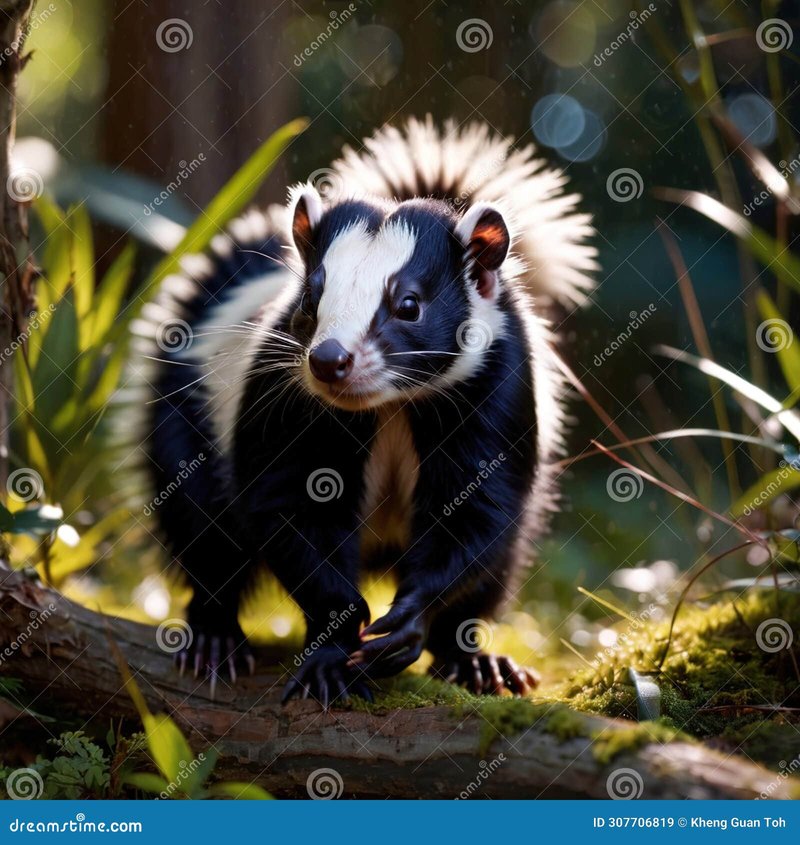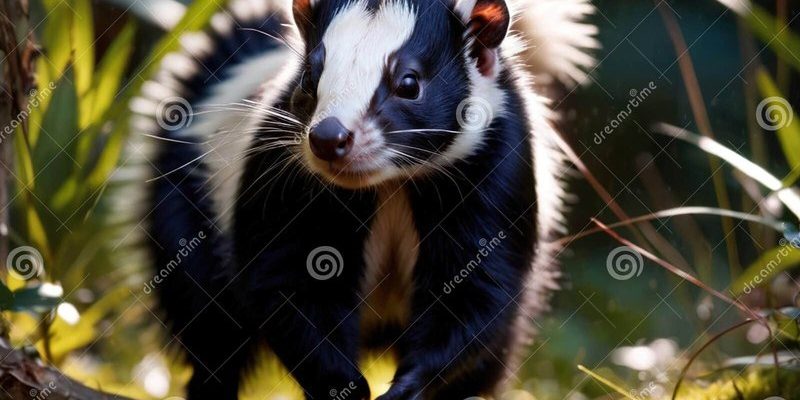
Now, when you picture a skunk, you might immediately think of that notorious spray they use for self-defense. However, there’s so much more to these fascinating creatures. In this article, we’ll dive deep into the different aspects of a skunk’s life and highlight how their behavior, diet, and even their interactions with other animals make them vital players in their ecosystems. So grab a cozy drink, and let’s explore this striped little wonder!
Understanding Skunk Species
There are a few different species of skunks, and they each bring something unique to their ecosystems. The most recognized is the striped skunk, known for its bold black and white patterns. Then there’s the spotted skunk, which is a bit smaller and offers a more sneaky appearance. Each type has its habitats, but they share a common knack for adapting to both urban and rural environments.
These animals are mostly nocturnal, meaning they’re active at night. This makes them essential for balancing the food web, as they help control the populations of insects and rodents. Imagine a moonlit night where skunks are busy munching on beetles and grasshoppers—a natural pest control service working silently!
Just like different types of workers in a factory, each skunk species has a role. For instance, the striped skunk tends to have a more diverse diet, while the spotted skunk is more specialized in its eating habits. This diversity is crucial because it means skunks can thrive in various environments, from forests to suburbs to fields.
The Skunk’s Diet and Nutritional Role
You might be surprised to learn that skunks are omnivores. They enjoy a varied diet filled with fruits, insects, small mammals, and even plants. Here’s where it gets interesting: by eating insects and rodents, skunks serve as a natural form of pest control. Think of them as the eco-friendly solution to managing bugs that might plague crops or invade your backyard!
Furthermore, skunks help in seed dispersal. When they munch on fruits, they often carry the seeds in their digestive systems and excrete them in different locations. This process helps new plants grow in various places, promoting biodiversity. It’s like nature’s way of gardening, right?
But, it’s not just about what they eat. Skunks also help recycle nutrients back into the soil. When they scavenge carcasses or decaying matter, they break it down and contribute to a healthy ecosystem. It’s a vital service that helps ensure the soil stays rich and fertile.
Skunks and Their Predators
In nature, it’s a constant game of survival. Skunks, despite their strong defense mechanism, fall prey to various animals. Common predators include hawks, owls, and even larger mammals like coyotes. This predator-prey relationship is essential for maintaining balance in the ecosystem.
Here’s the thing: skunks use their notorious spray primarily for defense. If threatened, they can spray a substance that can cause temporary blindness and irritation to their attackers. This bold defense allows them to survive in environments filled with potential threats.
However, their presence also creates opportunities for other animals. For instance, when a skunk is taken by a predator, it becomes a food source for others in the food chain. This chain reaction highlights the interconnectedness of all species—a reminder that every creature has a part to play, even those that seem small or overlooked.
Skunks and Ecosystem Health
Skunks contribute to ecosystem health in several ways. As omnivores, their varied diets help keep in check the populations of insects and small animals. This balance prevents overpopulation, which can lead to crop damage and other ecological issues.
Moreover, skunks are important for maintaining plant diversity. As I mentioned earlier, their role in seed dispersal allows different plants to flourish in new areas. This new growth helps create habitats for other wildlife, promoting a diverse ecosystem where all types of animals and plants can thrive together.
Another interesting aspect is their scavenging behavior. By consuming dead animals, skunks recycle nutrients back into the ecosystem. This process not only helps keep the environment clean but also enriches the soil, leading to healthier plants and, thus, a healthier ecosystem overall.
The Impact of Urbanization on Skunk Populations
As cities expand, skunks have adapted remarkably well. Urban areas provide them with ample food sources, such as garbage and gardens. However, living close to humans comes with challenges, including road traffic and habitat destruction.
You might be wondering how this affects them. Well, skunks that find themselves in urban environments often face increased risks of injury or death. However, they also contribute positively to urban ecosystems by managing pest populations in parks and gardens.
This duality makes their role all the more vital. Cities can be habitats for diverse wildlife, but they require a balanced approach to coexist. Protecting skunks in urban settings means ensuring they have safe environments to thrive while still assisting humans in managing pest issues.
Conservation and Skunks
Though often seen as pests themselves, skunks need our protection. Habitat loss, road accidents, and diseases threaten their populations. Conservation efforts focus on preserving their habitats and educating the public about their critical role in the ecosystem.
By understanding how skunks contribute to their environments, we can learn to appreciate them more. Instead of viewing them as nuisances, seeing them as integral parts of nature helps foster a more coexistence-minded approach.
Encouraging local actions, like creating wildlife corridors or preserving green spaces, can help ensure that skunks continue to thrive. Supporting conservation organizations that work to protect their habitats is another excellent way to help these misunderstood creatures.
In conclusion, skunks might not be the first animals that come to mind when you think about ecosystem health, but they play a vital role. From pest control to seed dispersal, these little creatures contribute significantly to the balance of nature.
So, the next time you catch sight of a skunk—perhaps rummaging through a garden or waddling across the street—take a moment to appreciate what they do for the ecosystem. They’re not just the quirky, stinky neighbors of the animal kingdom; they’re essential players working hard to keep our environment in check. By recognizing and valuing the role of skunks, we can support their existence and enjoy the incredible benefits they provide to our world.

